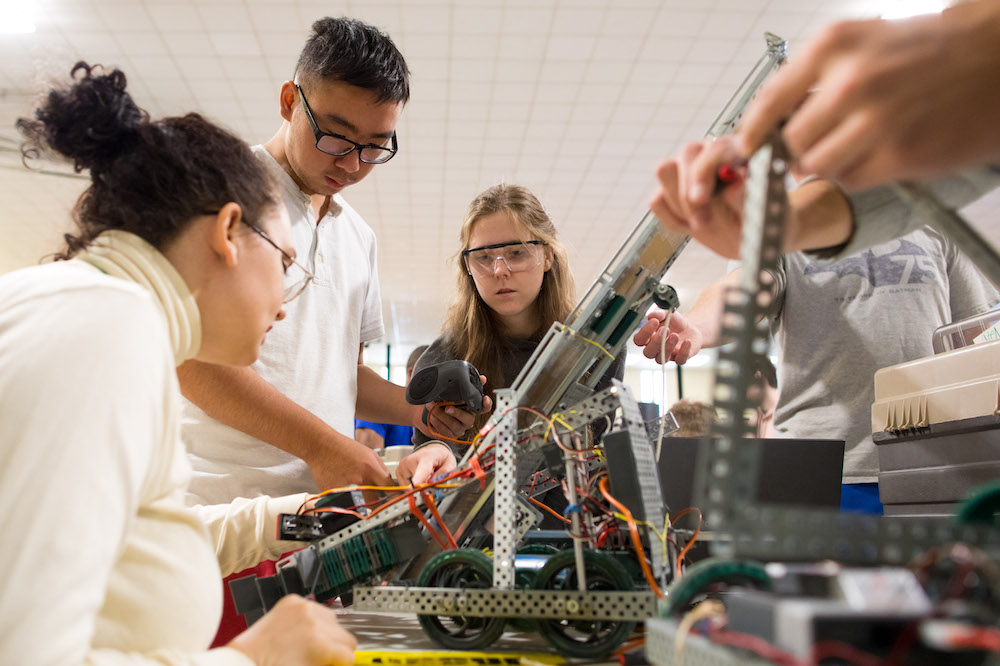Information for Faculty
 Thank you for your interest in becoming a Primary Investigator (PI) for a VIP team! The
VIP program allows us to help scale up research involving students, facilitating high-impact
research with relevance. Below, we've provided a little more information on the program
specifically for team leads. If you have any questions or would like to discuss your
ideas with the VIP administrators, please do not hesitate to reach out to us at our@kennesaw.edu.
Thank you for your interest in becoming a Primary Investigator (PI) for a VIP team! The
VIP program allows us to help scale up research involving students, facilitating high-impact
research with relevance. Below, we've provided a little more information on the program
specifically for team leads. If you have any questions or would like to discuss your
ideas with the VIP administrators, please do not hesitate to reach out to us at our@kennesaw.edu.
The application for new VIP Teams for the 2024-2025 academic year, is now available on the InfoReady platform. The deadline for submission is Wednesday, April 24, 2024.
-
What are the benefits of VIP for faculty?
The VIP program is designed to help faculty launch and sustain high-impact, long-term, large research projects. Faculty or staff who serve as Primary Investigators (PIs) on VIP projects will be well positioned for external funding, publications, and presentations. In addition, the campus will become part of the VIP Consortium, which provides resources on best practices in managing large research teams, assessment, etc. There is also initial seed funding for the first year.
-
What are my responsibilities as a faculty investigator on a VIP project?
All students will enroll in RES 4000/RES 7000 as part of the VIP experience, for a variable number of credits depending on the workload (we recommend one credit per semester so the students do not exceed the maximum credit hours too quickly).
As the Primary Investigator (PI) on this project, you will be assigned a section of RES 4000/RES 7000 each semester, and you will create the syllabus and assign grades at the end of the semester. As part of the "It's About Engagement" initiative, you will need to include a public dissemination of the work at the end of the semester (typically the Symposium of Student Scholars unless otherwise noted). Students also will need to write a reflection about their experiences.
As the PI, you will be responsible for overseeing all aspects of the research, making sure that students are participating effectively, teams are functioning well, and the research is advancing as proposed.
PIs will participate in virtual workshops and trainings before the Fall semester begins to familiarize themselves with VIP. The PI will be responsible for completing VIP progress reports and assessment information. The PI will facilitate internal budget spending in the first year and will work with Sponsored Programs to submit for external funding for their VIP project.
-
Are there any restrictions on who can lead a VIP project?
Full-time faculty or staff members from any discipline are eligible to be Primary Investigators (PIs) for a VIP team. Projects can include co-PIs. Projects can include some combination of other faculty members (full or part-time), undergraduate students, graduate students, staff members, co-investigators at other institutions, postdoctoral fellows, or anyone else who might contribute. The Primary Investigator(s), however, must be full-time faculty/staff at KSU.
-
Is there funding for VIP teams?
Yes. In the initial year, the Office of Undergraduate Research will provide each team with $5,000 in seed money to launch their VIP team. Spending of these funds must be done in accordance with regulations for state funding. It is expected that VIP teams will seek out external funding for their projects during the first year (if they haven't done so before then) so they can become self-sustaining for future years.
-
How will VIP applications be evaluated?
Due to funding constraints, not all applications for VIP teams will be accepted. Reviewers will consider the following factors when evaluating applications:
- Current external funding or strong potential for external funding in the next academic year: Because the seed funding is for one year, teams will be expected to be self-sufficient for subsequent years. Therefore, priority is given to teams that have already received external funding or who have a strong potential for external funding in the next academic year.
- Interdisciplinary: Projects that involve faculty and students from multiple disciplines, and in particular multiple colleges, will be prioritized.
- Large or potential to be large: VIP teams involve large numbers of researchers (faculty, staff, students, etc.). Priority will be given to teams that are already somewhat large or that have the potential for becoming larger in the next academic year.
- Potential for long-term research: VIP teams at more established sites often involve programmatic research over decades. A proposal involving one quick study that will be over in less than a year does not achieve the mission of VIP. Priority will be given to programmatic research that has occurred over a long period of time or that has the potential.
- Productivity (external funding, publications): On established VIP teams at other consortium sites, the projects result in many funded grants and regular publications in top journals. Priority will be given to projects that have a history of this productivity or that have the potential within a relatively short period of time.











